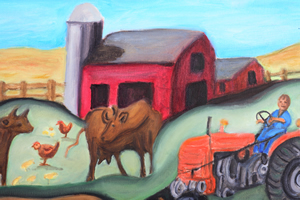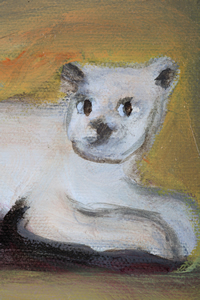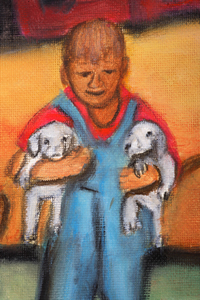The Farm This novel takes place in southern Wisconsin in Kenosha County during the month of July in 1951. Nearly all of the action takes place within ten days on the family farm on Bentz Road, which is now 85 th Street. Adam (10 years old) is the main character. He and his brother Karl (12 years old) were raised on the farm and attended Whittier School on Cooper Road about a half mile away. The farm was purchased by Sophia Montanya (Grandma) and her husband, Frederico (Grandpa) during the Depression In the 1930's. The small farm with its cows, pigs, chickens, ducks, and geese is central to the plot. It's in the barn where Adam is traumatized and then unable to tell his parents what happened to him.
|
|
Adam quickly disappeared into the cavernous mouth of the sagging barn just like Ulysses entering the cave of the Cyclops. Inside his eyes adjusted to the darkness, noticing the empty stanchions where the cows were milked twice daily. The stalls needed fresh straw. His nostrils stung from the pungent odor of manure mingled with stale urine in the cement gutter. ... As he jumped across the waste trench, he heard the squeaking of the wheelbarrow coming over the stone path leading toward the barn door. (Chapter 2)
Adam's mouth gaped with amazement. He was in awe over the wondrous birth of the calf. The watchful mother, Daisy, turned her head to get a glimpse of her calf trying to stand up. A few minutes later the little bull pushed up his wobbling back legs first and then his tottering front legs. He just stood there shivering as Grandma led him across the manure trench to Daisy's udder, placing a bulging teat into the calf's mouth. (Chapter 4) |
|
The Factory
Giovanni Montanya is the father of the two boys, Adam and Karl. He was born and raised in Italy although he graduated from Bradford High School. Giovanni works with his brother-in-law Pete Mueller at Nash Motors on the assembly line in Kenosha. Both men were drafted into World War II after the bombing of Pearl Harbor. Giovanni was married to Gertrude Mueller in 1939. He left his family behind to fight overseas. When he returned to Kenosha County four years later, his children didn't recognize him. The brutality of the war had changed him. The war continues to influence the lives of the characters in this story.
"Your uncle and I worked on the assembly line. We made 5000 of those Nash 600's, but then production stopped right after Pearl Harbor was bombed. You were just a baby, only a couple of months old when it happened," mentioned Giovanni, reaching into the back pocket of his jeans. He removed a crumpled packet of Lucky Strikes. |
"Before we got into World War II, the company sent a '41 Nash all over the country with a big sign on the roof. It said 'I am Using One-Third Less Gasoline,'" informed Uncle Pete, lighting his pipe again and then offering his matches to Giovanni. (Chapter 1)
"Nash Motors shut down. It didn't make any more cars for the next four years," uttered Giovanni, exhaling a cloud of smoke. "Our factory only manufactured airplane engines, propellers, and helicopters during the war." (Chapter 1) |
Gertrude always took her two sons with her to Sunday mass at St. George's Parish, where Father Fortmann officiated at the 10:00 o'clock mass. She totally avoided Father Furstenberg even though he was a good friend of her sister-in-law, Clara and nephew, Kevin. There was something about that priest that she didn't like, but she couldn't put a finger on it. After mass, they would always stop at Spetzmann's Tap to drag Giovanni out of the tavern so they'd be home for Sunday dinner together.
Once the light changed, Gertrude drove straight past the A&P Grocery Store, where she had filled out an application to work stocking the shelves. She even applied at Dober's Bakery, but no one was hiring during the summer. Gertrude resented selling vegetables at the market, which meant going to a different part of town every day of the week except Sunday. She was grateful that the war was over, but it changed her husband. Giovanni wasn't the same man that she married back in 1939. Even though he was depressed and sullen, he would not confide in her about the horrors of the war. (Chapter 5).



